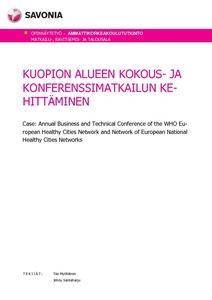From Manual to Smart: Innovating IoT Networks Lab
Andrade-Cheneuer, Miguel (2024)
Andrade-Cheneuer, Miguel
2024
All rights reserved. This publication is copyrighted. You may download, display and print it for Your own personal use. Commercial use is prohibited.
Julkaisun pysyvä osoite on
https://urn.fi/URN:NBN:fi:amk-2024052415397
https://urn.fi/URN:NBN:fi:amk-2024052415397
Tiivistelmä
The primary objective of this thesis was to introduce network automation into the Networks lab at Metropolia University of Applied Sciences, Espoo campus. By implementing automated systems, the aim was to transform the existing network infrastructure, simplify operational processes, streamline administrative tasks, and enhance the overall learning experience for students.
This thesis thoroughly explored the design, implementation, and evaluation of network automation solutions customized for the unique requirements of the Espoo campus. Through a variety of approaches, the research addressed key challenges such as resource optimization and the integration of real-world simulations as learning aids for students. The aim was to not only enhance the educational experience but also to equip students with practical skills in network management and automation, thus ensuring coherence between theoretical knowledge and real-world application.
The main goal of the thesis was to develop a set of flexible and adaptable Ansible playbooks and scripts tailored to the specific needs of the Networks lab. These tools were intended for use by both the lab administrator and students. The proposed solution underwent testing with students from various academic years and majors to demonstrate the potential advantages of using the tool within the lab environment, both for administrators and for students seeking to understand its benefits.
The test results convincingly demonstrated the effectiveness of the implemented network automation tools. The deployment of these solutions resulted in a more efficient and productive environment within the Networks lab. Notably, there was a significant reduction in the time required for configuration and management tasks, which can allow both administrators and students to focus more on experiential learning and less on routine maintenance. These improvements underscored the substantial benefits of integrating network automation into educational settings, ultimately enhancing both the operational efficiency and educational quality of the lab.
This thesis thoroughly explored the design, implementation, and evaluation of network automation solutions customized for the unique requirements of the Espoo campus. Through a variety of approaches, the research addressed key challenges such as resource optimization and the integration of real-world simulations as learning aids for students. The aim was to not only enhance the educational experience but also to equip students with practical skills in network management and automation, thus ensuring coherence between theoretical knowledge and real-world application.
The main goal of the thesis was to develop a set of flexible and adaptable Ansible playbooks and scripts tailored to the specific needs of the Networks lab. These tools were intended for use by both the lab administrator and students. The proposed solution underwent testing with students from various academic years and majors to demonstrate the potential advantages of using the tool within the lab environment, both for administrators and for students seeking to understand its benefits.
The test results convincingly demonstrated the effectiveness of the implemented network automation tools. The deployment of these solutions resulted in a more efficient and productive environment within the Networks lab. Notably, there was a significant reduction in the time required for configuration and management tasks, which can allow both administrators and students to focus more on experiential learning and less on routine maintenance. These improvements underscored the substantial benefits of integrating network automation into educational settings, ultimately enhancing both the operational efficiency and educational quality of the lab.
Kokoelmat
Samankaltainen aineisto
Näytetään aineisto, joilla on samankaltaisia nimekkeitä, tekijöitä tai asiasanoja.
-
Kuopion alueen kokous- ja konferenssimatkailun kehittäminen : case: Annual Business and Technical Conference of the WHO European Healthy Cities Network and Network of European National Healthy Cities Networks
Myöhänen, Tiia; Santaharju, Jenny (Savonia-ammattikorkeakoulu, 2015)Opinnäytetyön tarkoituksena oli selvittää Kuopion alueen kokous- ja konferenssimatkailun kehittämistä WHO Healthy Cities -konferenssin sidosryhmien näkökulmasta. Työ on osa Kuopion kaupungin Convention Bureau hankkeen ... -
Network Security : Securing Network Equipment and Network Users’ Environment
Mbah, Mbah (Savonia-ammattikorkeakoulu, 2010)The purpose of this final year project is to research on new network security products and implementation techniques in order to enhance the current network security structure of Savonia University of Applied Sciences. ... -
Improving Information Security in Healthcare Networks With Software-Defined Networking
Karhunen, Petri (2020)Monet nykypäivän tietoverkot ovat seurausta 1970-luvulla tehdyistä verkkojen ja protokollien suunnittelupäätöksistä. Tietoverkkojen vaatimukset ovat kehittyneet nopeammin kuin niihin liittyvät tekniikat ja toiminnot. ...



